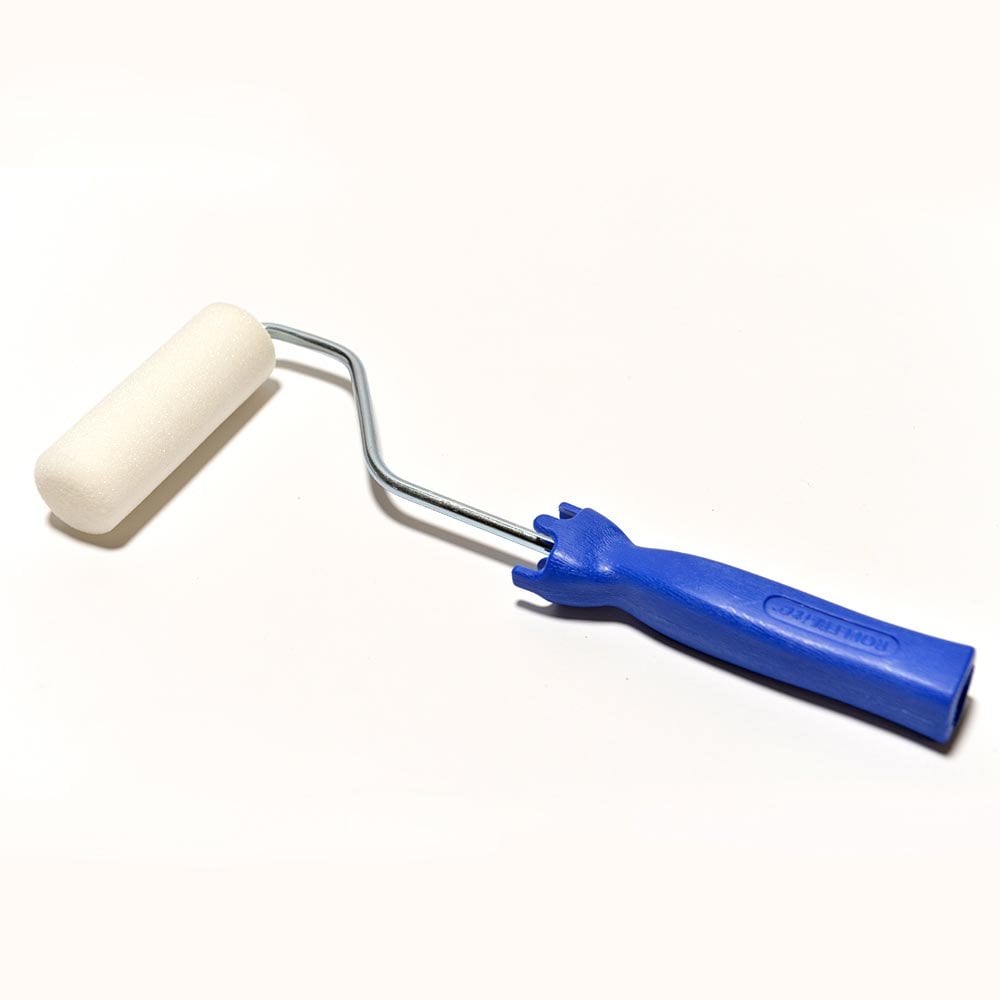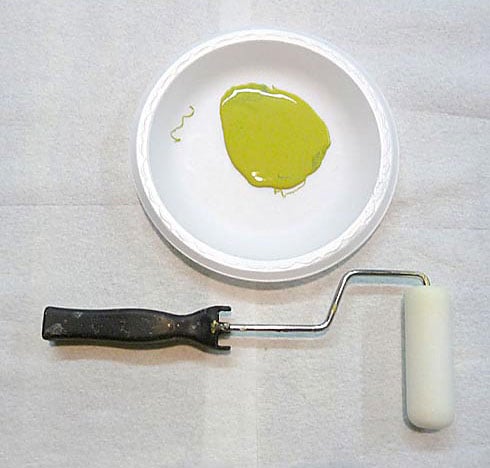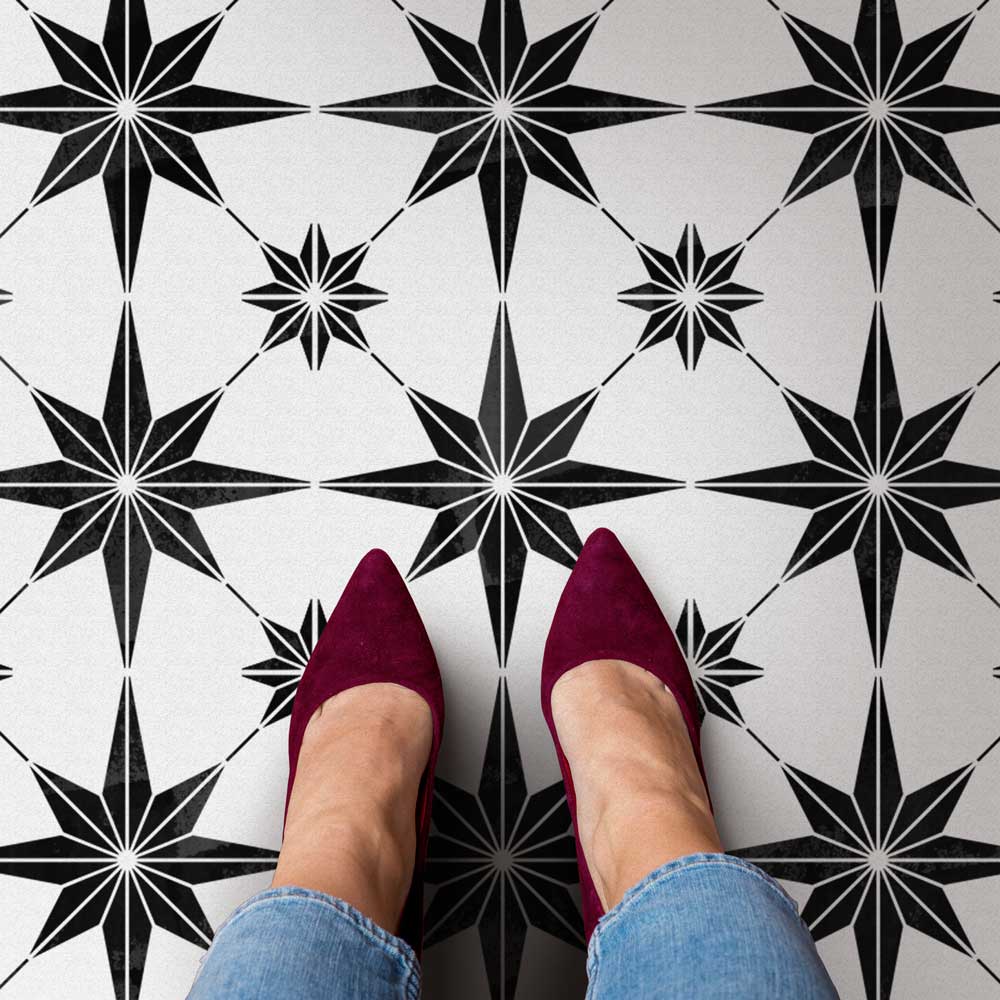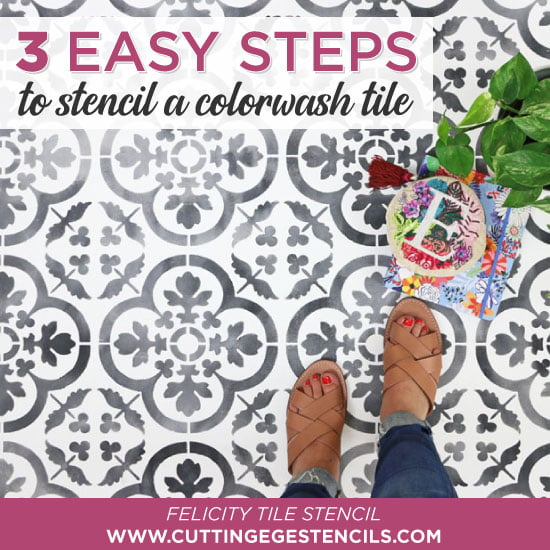How To Stencil Faux Designer Tile With A Geometric Tile Stencil
Easily Stencil Outdated Tile Into Looking Brand New!
Welcome back DIY’ers!
Cutting Edge Stencils wants to share more
stenciled tile floor inspiration with you this week. We just released a
new stencil collection and one
tile stencil, in particular, is selling out quick! We are going to show you how to stencil our
Star Tile Stencil pattern from start to finish!

I know you’re excited to jump right in, but there are a few preparation steps you must complete before you begin
stenciling a tile floor. Sand your floor down with 120-220 grit sandpaper. This will allow the paint to adhere to the tile floor better.
Tile stencils work on all types of floors! We’ve even
stenciled a linoleum floor a year ago and it still looks brand new!
 Stenciling
Stenciling on a dirty floor is not ideal. When you’re done sanding,
pick up the left-over dust by wiping your tile floor down with a wet rag. Once the floor is dry, tape the perimeter of the bottom of your walls with
blue painters tape. You don’t want to get any unwanted paint on your baseboards!

Next step, priming your floor. Priming ensures better adhesion of paint to the surface and increases paint durability, which is important when
stenciling a tile floor. We always recommend
STIX primer because we found it provides the best adhesion. Apply 2 coats of primer and allow it to dry overnight.

Roll on Black by Benjamin Moore with a dense foam
roller for stenciling. It’s super important you paint your tile with paint in a
flat latex finish, otherwise you will increase your chances of stencil seepage under the
tile stencil. Apply 2-3 coats of paint before you begin
stenciling. 
When
stenciling faux tile, you want to
reduce chances of stencil seepage or “bleed” as much as you can. A great way to do this is to apply repositionable spray adhesive to the back of your
tile stencil! This will allow the stencil to stick to the painted tile floor and prevent the stencil from moving during your DIY project.

Evenly load a 2" dense foam
roller for stenciling with your
tile stencil color. We wanted to stencil a high-contrast floor so we choose White by Benjamin Moore. For the best results, we are
stenciling with paint in a
flat latex finish!

People commonly think that just one thick layer of paint will do the job.
It’s quite the opposite! Roll-on (2) light layers of paint over the
tile stencil for nice crisp lines. If the paint starts to pull up, just wait for the first coat to dry.

Looking good! Now you’re ready to conquer the rest of your new tile floor!

Once the paint has dried, realign the
stencil with the previously painted registration marks and repeat!

To protect your
stenciled tile floors from everyday wear and tear, we recommend sealing it with Varathane’s
water-based polyurethane. We recommend rolling 2-3 coats of
water-based polyurethane on with a dense foam
roller for stenciling. Allow it to dry completely before adding the next coat.

 I know you’re excited to jump right in, but there are a few preparation steps you must complete before you begin stenciling a tile floor. Sand your floor down with 120-220 grit sandpaper. This will allow the paint to adhere to the tile floor better. Tile stencils work on all types of floors! We’ve even stenciled a linoleum floor a year ago and it still looks brand new!
I know you’re excited to jump right in, but there are a few preparation steps you must complete before you begin stenciling a tile floor. Sand your floor down with 120-220 grit sandpaper. This will allow the paint to adhere to the tile floor better. Tile stencils work on all types of floors! We’ve even stenciled a linoleum floor a year ago and it still looks brand new!  Stenciling on a dirty floor is not ideal. When you’re done sanding, pick up the left-over dust by wiping your tile floor down with a wet rag. Once the floor is dry, tape the perimeter of the bottom of your walls with blue painters tape. You don’t want to get any unwanted paint on your baseboards!
Stenciling on a dirty floor is not ideal. When you’re done sanding, pick up the left-over dust by wiping your tile floor down with a wet rag. Once the floor is dry, tape the perimeter of the bottom of your walls with blue painters tape. You don’t want to get any unwanted paint on your baseboards!  Next step, priming your floor. Priming ensures better adhesion of paint to the surface and increases paint durability, which is important when stenciling a tile floor. We always recommend STIX primer because we found it provides the best adhesion. Apply 2 coats of primer and allow it to dry overnight.
Next step, priming your floor. Priming ensures better adhesion of paint to the surface and increases paint durability, which is important when stenciling a tile floor. We always recommend STIX primer because we found it provides the best adhesion. Apply 2 coats of primer and allow it to dry overnight.  Roll on Black by Benjamin Moore with a dense foam roller for stenciling. It’s super important you paint your tile with paint in a flat latex finish, otherwise you will increase your chances of stencil seepage under the tile stencil. Apply 2-3 coats of paint before you begin stenciling.
Roll on Black by Benjamin Moore with a dense foam roller for stenciling. It’s super important you paint your tile with paint in a flat latex finish, otherwise you will increase your chances of stencil seepage under the tile stencil. Apply 2-3 coats of paint before you begin stenciling.  When stenciling faux tile, you want to reduce chances of stencil seepage or “bleed” as much as you can. A great way to do this is to apply repositionable spray adhesive to the back of your tile stencil! This will allow the stencil to stick to the painted tile floor and prevent the stencil from moving during your DIY project.
When stenciling faux tile, you want to reduce chances of stencil seepage or “bleed” as much as you can. A great way to do this is to apply repositionable spray adhesive to the back of your tile stencil! This will allow the stencil to stick to the painted tile floor and prevent the stencil from moving during your DIY project.  Evenly load a 2" dense foam roller for stenciling with your tile stencil color. We wanted to stencil a high-contrast floor so we choose White by Benjamin Moore. For the best results, we are stenciling with paint in a flat latex finish!
Evenly load a 2" dense foam roller for stenciling with your tile stencil color. We wanted to stencil a high-contrast floor so we choose White by Benjamin Moore. For the best results, we are stenciling with paint in a flat latex finish!  People commonly think that just one thick layer of paint will do the job. It’s quite the opposite! Roll-on (2) light layers of paint over the tile stencil for nice crisp lines. If the paint starts to pull up, just wait for the first coat to dry.
People commonly think that just one thick layer of paint will do the job. It’s quite the opposite! Roll-on (2) light layers of paint over the tile stencil for nice crisp lines. If the paint starts to pull up, just wait for the first coat to dry.  Looking good! Now you’re ready to conquer the rest of your new tile floor!
Looking good! Now you’re ready to conquer the rest of your new tile floor!  Once the paint has dried, realign the stencil with the previously painted registration marks and repeat!
Once the paint has dried, realign the stencil with the previously painted registration marks and repeat!  To protect your stenciled tile floors from everyday wear and tear, we recommend sealing it with Varathane’s water-based polyurethane. We recommend rolling 2-3 coats of water-based polyurethane on with a dense foam roller for stenciling. Allow it to dry completely before adding the next coat.
To protect your stenciled tile floors from everyday wear and tear, we recommend sealing it with Varathane’s water-based polyurethane. We recommend rolling 2-3 coats of water-based polyurethane on with a dense foam roller for stenciling. Allow it to dry completely before adding the next coat. 










